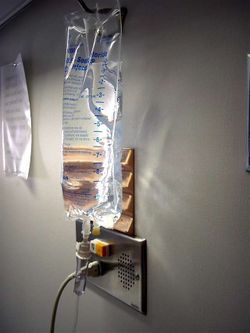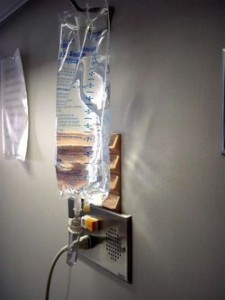Last week we attended a seminar on the HIV situation in Kenya today. It was sponsored by an (ACU) – AIDS Control Unit (that’s probably part of the giant National AIDS Control Council ) – which is a paid kitty to educate as many workers about HIV. Here’s what I found new, but maybe many of you already know.
Economy
– AIDS is related to trade, and follows routes of productive trade; trading places like Salgaa and Mlolongo in Kenya, which are popular stops for truck drivers, are known as pandemic centres in the medical community.
– A human has about 36 years of productive life, but 22 of those can be lost to HIV
– Globalisation, social mobility, conflict and war have also contributed greatly to the spread of AIDS around Africa.
– HIV costs the economy greatly through loss of manpower, increased medical costs, replacement staff, funeral expenses, increased dependency etc.
Video
They started the session by showing a very moving 20-minute video on STD’s and HIV that I first saw in 2002. The video’s narrator was unknown to most people a few years ago when the video was shot, but is today Kenya’s Minister for Communications – MP Raphael Tuju.
Stats
You learn lots of new statistics and facts:
– 80 – 90% of those who die are in the 15 – 49 age category (most productive years)
– STD’s facilitate the spread of HIV and are responsible for 80% of infertility in Kenya (and Chlamydia, is rarely detected as it causes no discomfort)
– 70 – 80% of transmission in Kenya is through sex, 5 – 10% is mother to child, smaller percentages are from drug use, or blood transmission
– 90% of adults who get tuberculosis are likely to have HIV (remember, we are immunized at birth against TB)
It gets scary
– Wives in (rural) Kenya are highly susceptible to the virus and STD’s because they often have sex, when not in an aroused state, leading to bruising, and bleeding which facilitate infections.
– The second phase of the HIV, known as the asymptomatic (silent) phase, can last from 0 to perhaps 15 years; a person carrying the virus, may not display any symptoms or illness.
– HIV is mostly discovered in the third phase, when someone suffers many illnesses; but it’s often too late for any meaningful treatment
– The daily papers are full of obituaries of young people who passed away after short illnesses that are normally curable
– HIV can be passed to a baby through breast milk (also during pregnancy and the birth process)
Drugs are scary
– Anti-retro-viral drugs (for treatment of HIV) have very bad side effects which have even led to the death of some patients
– One you start a particular drug cocktail, it is not advisable to switch to a cheaper, generic one
– Overuse of antibiotics during pregnancy can cause fungal infections.
Bad traditions
– “We were circumcised on the same day, with the same knife” is a call to brotherhood that men often use. But such practices need to be updated, so that, perhaps, one knife per boy is used on that special day.
– While the Luo are chastised for their wife inheritance customs, in other communities (all over the country) young widows (whose husbands may have died from AIDS, and don’t know their own HIV status) have silent affairs, cohabit, or even re-marry.
– The Church is still very negative towards potentially useful practices such as contraceptives and is also not very supportive of HIV+ people.
– Many family members still show very little sympathy or support to their HIV+ relatives
– Many employers still show very little sympathy or support to HIV+ workers.
– Many government programs relating to AIDS are carried out without involving the views or efforts of HIV+ people
– Many hospital workers, who are not AIDS specialists, show very little sympathy to HIV+ patients.
There’s hope
– The cost of drugs has come down from about 50,000 shillings a month in the mid-90’s to about 10,000 a month today (even 100 shillings for some generic doses at Kenyatta Hospital and other public hospitals)
– Hospitals now test pregnant mothers for the virus – and with drugs and caesarean operations, they have a 40% success rate in delivering HIV negative babies from mothers who are positive.
– Behaviour change (i.e. eating a balanced diet, avoiding re-infection, and living healthy) can prolong the life of a HIV+ person
– Many employers now provide contraceptives (free condoms) in the workplace, enable discussion (such as this seminar)
– There are many free VCT (voluntary counselling & testing) centres around the country that offer anonymous services. There are over 6 different HIV tests available now from the simple & cheap (which take some minutes) to the complex.
– A person with HIV can officially retire on medical grounds and get their full benefits. Also, under the law, they may continue to work, without hindrance.
-(Cynical but true) HIV has spawned a massive industry of NGO’s and community-based organizations that provide donor-supported employment and livelihoods for thousands of Kenyans. (We all got paid 500 shillings to attend the seminar and each speaker received a couple of thousand for their talk)


